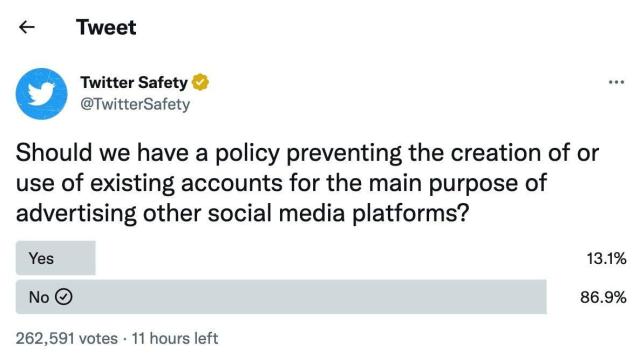Twitter has once again rushed to undo an impulsive new policy less than a day after introducing it. This week’s victim: Elon Musk’s sudden decision to ban external links to other social media sites.
For anyone still catching up, Twitter on Sunday published a since-deleted blog post saying it would no longer allow the, “free promotion of certain social media platforms,” on its site. That ban covered accounts created for the sole creation of advertising but also, crucially, would have applied to content linking out to Facebook, Instagram, Mastodon, Truth Social, Tribel, Nostr, and Post at the “tweet and account level.” That means the policy would have banned both tweets including links to other sites and links placed in users’ account names or bios. The abrupt shift came just days after Twitter began applying a, “potentially harmful” label to its emerging competitor Mastodon.
Twitter, when it’s not being used by trolls to bully marginalised groups and shitpost about the daily news, is and has been at its core, a shameless self-promotion platform. It’s unsurprising then, that a groundswell of users immediately recoiled at Twitter’s reactive new policy. Musk personally responded to one of those critical tweets on Sunday asking a user to offer up their suggestion for a new policy. After some back and forth from upset users saying they could no longer link out to their own businesses under the rules, Musk reneged and announced an alternative on the fly.
“Policy will be adjusted to suspending accounts only when that account’s *primary* purpose is promotion of competitors, which essentially falls under the no spam rule,” Musk tweeted. The CEO followed that up with another tweet saying votes, presumably conducted over Twitter’s rudimentary polling feature, would take place for major policy changes moving forward.
Policy will be adjusted to suspending accounts only when that account’s *primary* purpose is promotion of competitors, which essentially falls under the no spam rule
— Elon Musk (@elonmusk) December 18, 2022
Not long after Musk backtracked, a separate Twitter account called Twitter Safety released its own tweet probing users if the platform should, “have a policy preventing the creation of or use of existing accounts for the main purpose of advertising other social media platforms?” At the time of writing, a resounding 86.9% of respondents voted against introducing such a rule.
Should we have a policy preventing the creation of or use of existing accounts for the main purpose of advertising other social media platforms?
— Twitter Safety (@TwitterSafety) December 19, 2022
Confusing things ever further, Musk published a tweet just hours before the “policy” took effect seemingly contradicting its entire purpose. In it, Musk said “casually sharing occasional links is fine,” but went on to condemn “relentless advertising of competitors for free,” which he called absurd.
Casually sharing occasional links is fine, but no more relentless advertising of competitors for free, which is absurd in the extreme
— Elon Musk (@elonmusk) December 18, 2022
As some users responding to Musk’s tweet mentioned, the inherently subjective nature of that opinion makes basing a policy off of it inherently subjective. That subjectivity opens Twitter’s new rules up to the exact same criticisms of inconsistency and arbitrariness Musk and other so-called free speech absolutists lodged towards the company’s prior leadership. In other words, the world’s once again watching, in real time, as one of the world’s richest men learns just how difficult it is to actually run a social media company.
